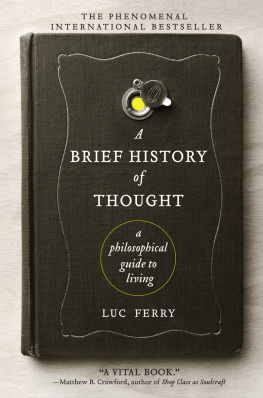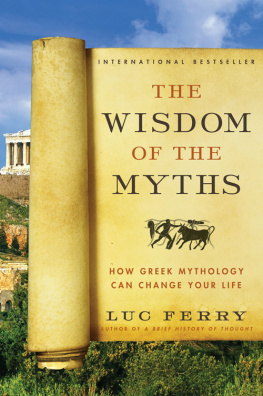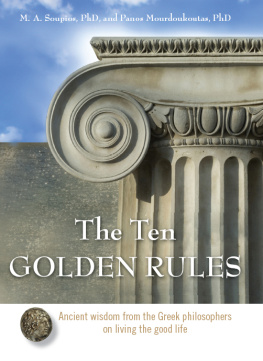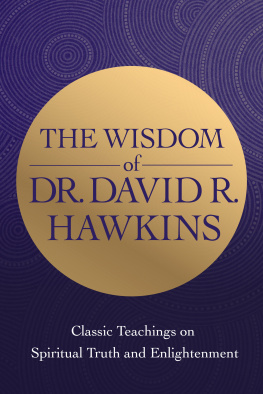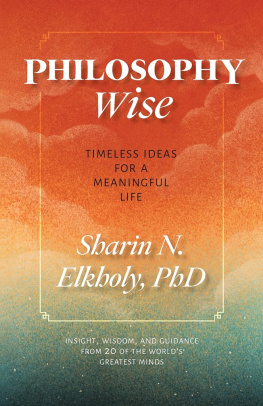A
BRIEF HISTORY
OF
THOUGHT
A PHILOSOPHICAL GUIDE TO LIVING
Luc Ferry
Translated by Theo Cuffe

For Gabrielle, Louise and Clara
Contents
While chatting over supper on holiday, some friends asked me to improvise a philosophy course for adults and children alike. I decided to accept the challenge and came to relish it. The exercise forced me to stick to essentials no complicated words, no learned quotations and no references to obscure theories. As I worked through my account of the history of ideas, without access to a library, it occurred to me that there is nothing comparable in print. There are many histories of philosophy, of course; some are excellent, but even the best ones are a little dry for someone who has left university behind, and certainly for those yet to enter a university. And the rest of us are not particularly concerned.
This book is the direct result of those evenings amongst friends, so I have tried to preserve the original impromptu style. Its objective is both modest and ambitious: modest, because it is addressed to a nonacademic audience; ambitious, because I have not permitted myself any concession to simplification where it would involve distortion of the philosophical ideas at its heart. I feel too much respect for the masterpieces of philosophy to caricature them. Clarity should be the primary responsibility of a work addressed to beginners, but it must be achieved without compromising the truth of its subject; otherwise it is worthless.
With that in mind, I have tried to offer a rite of passage, which aims to be as straightforward as possible, without bypassing the richness and profundity of philosophical ideas. My aim is not merely to give a taste, a superficial gloss, or a survey influenced by popular trends; on the contrary I want to lay bare these ideas in their integrity, in order to satisfy two needs: that of an adult who wants to know what philosophy is about, but does not necessarily intend to proceed any further; and that of a young person who hopes eventually to further their study, but does not as yet have the necessary bearings to be able to read these challenging authors for herself or himself.
I have attempted to give an account of everything that I consider to be truly indispensable in the history of thought all that I would like to pass on to family and those whom I regard as friends.
But why undertake this endeavour? First, because even the most sublime spectacle begins to pall if one lacks a companion with whom to share it. I am increasingly aware that philosophy no longer counts as what is ordinarily thought of as general knowledge. An educated person is supposed to know his or her national history, a few standard literary and artistic references, even a few odds and ends of biology or physics, yet they most likely have no inkling of Epictetus, Spinoza or Kant. I am convinced that everyone should study just a little philosophy, if only for two simple reasons.
First of all, without it we can make no sense of the world in which we live. Philosophy is the best training for living, better even than history and the human sciences. Why? Quite simply because virtually all of our thoughts, convictions and values exist and have meaning whether or not we are conscious of it within models of the world that have been developed over the course of intellectual history. We must understand these models in order to grasp their reach, their logic and their consequences.
Many individuals spend a considerable part of their lives anticipating misfortune and preparing for catastrophe loss of work, accident, illness, death of loved ones, and so on. Others, on the contrary, appear to live in a state of utter indifference, regarding such fears as morbid and having no place in everyday life. Do they realise, both of these character-types, that their attitudes have already been pondered with matchless profundity by the philosophers of ancient Greece?
The choice of an egalitarian rather than an aristocratic ethos, of a romantic aesthetic rather than a classical one, of an attitude of attachment or non-attachment to things and to beings in the face of death; the adoption of authoritarian or liberal political attitudes; the preference for animals and nature over mankind, for the call of the wild over the cities of man all of these choices and many more were considered long before they became opinions available, as in a marketplace, to the citizen. These divisions, conflicts and issues continue to determine our thoughts and our words, whether we are aware of them or not. To study them in their pure form, to grasp their deepest origins, is to arm oneself with not only the means of becoming more intelligent, but also more independent. Why would one deprive oneself of such tools?
Second, beyond coming to an understanding of oneself and others through acquaintance with the key texts of philosophy, we come to realise that these texts are able, quite simply, to help us live in a better and freer way. As several contemporary thinkers note: one does not philosophise to amuse oneself, nor even to better understand the world and ones own place in it, but sometimes literally to save ones skin. There is in philosophy the wherewithal to conquer the fears which can paralyse us in life, and it is an error to believe that modern psychology, for example, can substitute for this.
Learning to live; learning to fear no longer the various faces of death; or, more simply, learning to conquer the banality of everyday life boredom, the sense of time slipping by: these were already the primary motivations of the schools of ancient Greece. Their message deserves to be heard, because, contrary to what happens in history and in the human sciences, the philosophers of time past speak to us in the present tense. And this is worth contemplating.
When a scientific theory is revealed to be false, when it is refuted by another manifestly truer theory, it becomes obsolete and is of no further interest except to a handful of scientists and historians. However, the great philosophical questions about how to live life remain relevant to this day. In this sense, we can compare the history of philosophy to that of art, rather than of the sciences: in the same way that paintings by Braque or Kandinsky are not less beautiful than those by Vermeer or Manet, so too the reflections of Kant or Nietzsche on the sense or non-sense of life are not inferior or superior to those of Epictetus, Epicurus or the Buddha. They all furnish propositions about life, attitudes in the face of existence, that continue to address us across the centuries. Whereas the scientific theories of Ptolemy or Descartes may be regarded as quaint and have no further interest other than the historical, we can still draw upon the collective wisdom of the ancients as we can admire a Greek temple or a Chinese scroll with both feet planted firmly in the twenty-first century.
Following the lead of the earliest manual of philosophy ever written , The Discourses of Epictetus from c . 100 AD, this little book will address its readers directly. I hope the reader may take my tone as a sign of complicity rather than familiarity.
Chapter 1
What is Philosophy?
I am going to tell you the story as well as the history of philosophy. Not all of it, of course, but its five great moments. In each case, I will give you an example of one or two transforming visions of the world or, as we say sometimes, one or two great systems of thought. I promise that, if you take the trouble to follow me, you will come to understand this thing called philosophy and you will have the means to investigate it further for example, by reading in detail some of the great thinkers of whom I shall be speaking.
Next page
